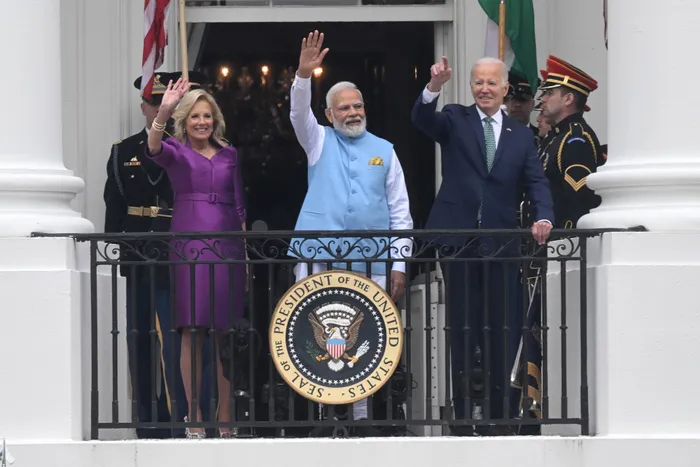India’s scandal: International law, moral standards bow to geopolitical interests

Left to right, US First Lady Jill Biden, India’s Prime Minister Narendra Modi and President Joe Biden wave from the Truman Balcony during a welcoming ceremony for Modi at the White House in Washington, on June 22, 2023. – Picture: Andrew Caballero-Reynolds / AFP
By David Monyae
The United States and India’s relationship, which has been cemented over the past few years by a mutual desire to contain the growth of China in South Asia, has been hit by a scandal following the unearthing of a plot to assassinate a Sikh separatist leader, Gurpatwant Singh Pannun, who is also an American citizen.
A charge sheet released by the US Department of Justice accused a US-based Indian national, Nikhil Gupta, of working with an Indian government security agency in plotting the assassination of Pannun.
Gupta was contacted by the officer in May 2023 who furnished him with information on Pannun’s residence in New York. Gupta was tasked with finding a hitman who would be contracted for US$100,000 to kill Pannun at his residence. However, the hitman Gupta hired turned out to be an undercover US law enforcement agent.
The planning of the assassination took place around the same time that the Indian Prime Minister Narendra Modi was being hosted in the White House by the US President Joe Biden in June 2023 on a state visit. Gupta was reportedly arrested by the law enforcement agents in the Czech Republic and is awaiting extradition to the US to stand trial.
This is the second time that the Indian government has been fingered in extrajudicial killing of a Sikh separatist leader in a foreign territory. Last September, the Canadian Prime Minister Justin Trudeau made explosive allegations against the Indian government claiming that it was behind the murder of Hardeep Singh Nijjar who was the leader of a Sikh community in the Canadian city of Vancouver in June 2023.
These allegations led to a diplomatic fallout between the two countries with India dismissing the allegations as absurd. Canada expelled an Indian diplomat who was believed to be working for the Indian intelligence agency.
Ottawa was forced to withdraw 41 of its diplomatic staff in India following the latter’s threat to strip them of their immunity. The revelations in Canada, triggered requests for a formal investigation by the family of another United Kingdom-based Sikh leader, Avtar Singh Khanda, who died in a UK hospital after a short illness.
These incidents are linked to New Delhi’s desire to suppress activism for the establishment of an autonomous and independent Sikh state, Khalistan, in Punjabi-speaking regions of northern India which Modi’s government perceives to be a national security threat. The Khalistan movement has been in existence since 1948 and gained momentum in the 1970s.
In 1985, the Sikh separatists were linked to an Air India plane crash following a bomb explosion which led to the deaths of 329 people. Both Nijjar and Pannun, well-known advocates of Sikh independence, have been classified by the Indian government as terrorists. Pannun has been organising a Sikh independence referendum in the diaspora which is irking the authorities in New Delhi.
Responding to the indictment from the US Department of Justice, the Indian Prime Minster Narendra Modi, said his government was willing to look into evidence behind the allegations and further stressed his administration’s commitment to the rule of law. He expressed confidence that this incident will not affect the bilateral relations between the US and India.
The Director of the US Central Intelligence Agency (CIA) travelled to India last August to meet his Indian counterpart, the head of India’s Research and Analysis Wing (RAW) to discuss the assassination plot.
Burns reportedly requested that India investigates to bring those involved to book and a reassurance that India will refrain from engaging in such plots in the future. Biden is also reported to have raised the matter with Modi during his visit to India on the occasion of the G20 Summit in September 2023.
The organising and execution of gruesome extrajudicial killings in the territories of other countries is a serious breach of international law and threat to international peace and stability.
However, the subdued manner in which the US and the UK are dealing with these allegations only serves to show the West’s double standards. One can only imagine the amount of tantrum that the western leaders would have thrown, if similar allegations were levelled against a country that the West views a threat or competitor.
Lesser and weaker allegations against countries like China and Russia are usually read on megaphones and accompanied by sanctions of one sort or another. However, because India is currently being useful to the West’s geopolitical agenda of suppressing the rise of China, it only gets a gentle slap on the wrist. This is a clear demonstration that in a western-led global order, international law and moral standards are subordinate to geopolitical interests.
Further, these incidents also show what the so-called world’s largest democracy is becoming under Modi. Modi’s brutality against the Sikh independence movement is not only international but has a domestic dimension as well. The Sikh-dominated Punjab state in northern India has been under increasing repression having been turned into a police state with internet connection and crowd gatherings banned.
It is believed that the crackdown was hardly justified as the Sikh separatist movement has been inactive for decades with no records of violence. Even the slain Sikh activists abroad had negligible support, which hardly warranted international manhunts.
Modi’s crackdown on Punjab seemed timed to mobilise and energise his Hindu nationalist base for the May 2024 elections which his party eventually won. Sacrificing principles of international law on the altar of political expediency can only create a dangerous world.
* David Monyae is the Director of the Centre for Africa-China Studies at the University of Johannesburg
** The views expressed in this article do not necessarily reflect the views of The African